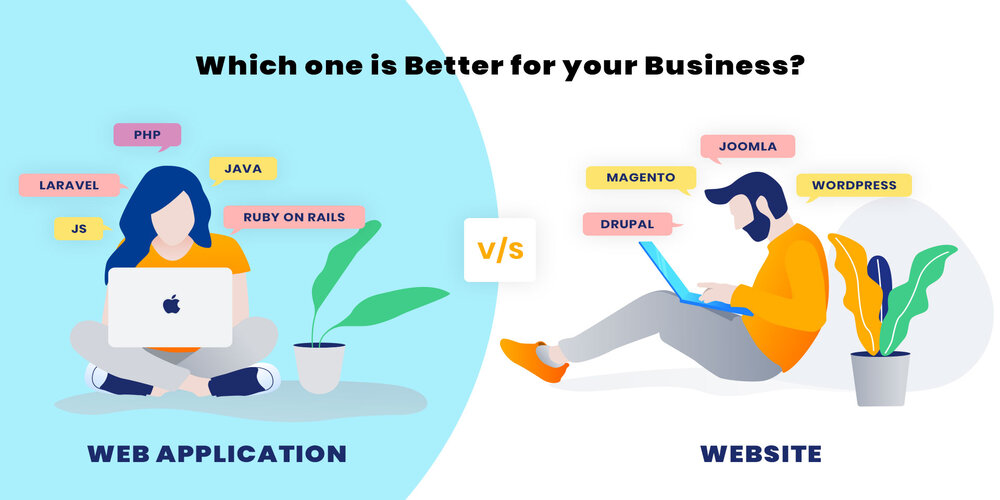Web Apps Vs. Website: Which One Is Better For Your Business?
Web Apps | 16-08-2021 | Himanshu Patel

Let’s get straight to business. The debate between a web app and a website is not some battle of the betters. Instead, everything depends on your usage, purpose, requirements, budget, and development team.
We have responsive websites, which can accommodate according to the underlying device. But, come what may, a website cannot replace what a web application can do. The same goes the other way. Web applications add a great amount of functionality, but they cannot deliver the intuitive experience a website can.
Both of them have a unique set of functions and features, which you must consider before choosing to go either way. Moving forward, we will explain the core concepts of a website and a web application, along with understanding their features.
At the end of the discussion, you will understand the difference between web apps vs. websites.
What is a Website?
Well, there is no point in going into the history of a website. Plus, you are on a website while reading this. Simply put, websites are web addresses accessible through a browser and display content.
Users engage with a website in different forms and formats, including images, videos, audio, text, graphics, illustrations, etc. You will find that websites are easy to access and use because they have a fixed web address.
For running a website on the web, you need to buy a domain name and choose a hosting plan. There are several other aspects to it, but for now, let’s understand that a website provides one-way information to the user.
The level of interaction and engagement a user can have with a website is limited. Mostly, there is no communication, but some websites are built to help users communicate.
Examples of websites include Amazon, YouTube, HubSpot, Wikipedia, etc. Some of the websites like Amazon, YouTube, etc., mostly the big ones, also have a mobile application. But they may not always have a web application. This is because their websites are so sophisticated that they can do anything a web app or a mobile application can do.
Websites are primarily divided into two forms, interactive and static. The static websites comprise the group with which we have been engaging for a long time now. But the interactive websites are the representatives of Web 2.0.
The interactive websites are the ones that creates a two communication channel between the platform and the user. The users can take an active part in running these websites.
Technologies Used to Build Websites
- HTML
- CSS
- SASS
Programming Languages
- Java
- Ruby
- PHP
- ASP.NET
Frameworks
- Zend
- Yii
- Symphony
- CodeIgnitor
- Cake PHP
- C#
- Struts
- Scala
- Rails
- Sinatra
Main Features of Websites
Building a website is easier said than done. After all, you are addressing the potential of millions of people using the same interface almost every day. So, the level of sophistication required to build and run a successful website increases with the number of users. Hence, it is important to work with a professional website development company that knows the stakes and can deliver a website with the following features.
1. Browser Compatibility
A website must be compatible with every browser. No matter whether your users are using Google’s Chrome or Apple’s Safari, you cannot and should not be partial here. Every website needs to run as smoothly as possible on every web browser. This stability is the core feature of a website. Websites that do not run on every web browser lose confidence and users.
2. Systematic Information Layout
Websites are mostly used to share and receive information. The relationship between a user and a website is limited. Hence, the information is shared strategically and that too from a user’s perspective.
Websites prioritize the information that is shared with the users, making it easier to digest. Here, the information they need to read first is always preferred because it converts better than a situation where the information shared is not aligned with the user’s interests.
3. Compatible with Mobile
Websites today need to be responsive and compatible with handheld devices. The majority of people use their mobile phones to conduct a search or buy a new product. Unresponsive websites won’t conform to the dimensions and layout suitable with a mobile device, which hinders user experience. So, every modern and well-performing website is built to be compatible with different mobile devices.
4. Fast Loading
Websites are built to load faster as slow-loading websites are not suitable for business. Ergo, a website development company makes an effort to build a website that has the right elements to take 4 to 6 seconds for completely loading the page. Websites that load slower than the standard time frame lose the audience, user’s interest, and ranking.
5. Rich Display
Websites can be customized according to your requirements and budget. You can add 3D elements to the website or add a simple image. It is entirely up to you what kind of website you want to build.
But if you ask your website development company to make it a good-looking and interactive website, the rich graphical display you can achieve here is remarkable.
What Are Web Applications?
Going by the words, it’s an application that runs on the web. So, a web application is not like the Facebook and Instagram application you have on your phone. These are applications that run on a web browser and need not be installed.
In other words, web applications are similar to software that can be accessed by any user who has a browser on their phones or desktops. The level of interaction a user can experience with web applications is much higher than a website.
Besides accessing information, web applications also allow users to add, edit, and modify data according to their requirements. For instance, you can read, send, delete, and organize your emails in Gmail. Yes, Gmail is a web application.
Other examples of web applications that you use almost every day are Twitter, YouTube; even the web version of Facebook can be considered as a web application. Understanding the distinction between the two is vital before you can hire a web apps development company.
Web applications are highly customizable, but one place they may lack is the aesthetics and a rich display of content. Because the web apps are inclined towards performing better, they are not as great as a website in terms of aesthetics.
In terms of development, a web application requires server-side and client-side scripts written for specific functions.
Technologies Used to Build Web Applications
Web application development companies use a series of technologies to build the apps. Their choice of technology depends on the requirements, budget, expertise, and experience of working with the same. Here is a list of the most popular technologies used for this purpose.
Client-Side Scripting
- HTML
- Cascading Style Sheets (CSS)
- JavaScript
- Dojo Toolkit (A JS framework)
- jQuery
- Ajax
Server-Side Scripting
- PHP
- ASP
- ASP.NET
- Ruby on Rails
- Perl
- Python
- Zend Framework
- Cold Fusion
Frameworks to Build Web Applications
- Express
- Django
- Laravel
- Spring
- Angular
- React
- Vue
- Ember
Main Features of Web Applications
1. Runs on Every Platform
The best thing about a web application is that they are attached to the web browser and not the phone. As a result, they run on every mobile device irrespective of the underlying platform.
This makes them highly flexible and able to provide a native-like user experience to the users. Web applications run on desktops and mobile devices with an equally impressive interface and intuitiveness.
Depending on how a web app development company builds one, they can function accordingly.
2. Hosted on the Cloud
Web applications are cloud-hosted, which ensures that they are always running, reliable, and resilient in terms of continuous operations. With the cloud, the web application is easy to scale, which is a cost-effective option for small businesses and startups.
Web applications function remarkably well if they are provided with high-performance cloud solutions. Moreover, it adds resilience, which means that even at a time of outage or downtime, the web application can perform unchanged.
3. Single Page Applications
Single-page applications are different from traditional applications. The former does not create an entirely new page for every user request, which is exactly what happens in a traditional application.
Due to this, these applications are slower, and the single-page applications are faster and smoother. The users are able to navigate them faster, providing a positive user experience.
4. Security
Your web app development company will build it with HTTPS security settings. Ensuring effective security for your customers is imperative. It is more important here than websites because web apps are more functional than websites.
As a result, users end up sharing their personal information and data with the web apps. Especially when it comes to payments, the users need to be assured of the safety measures put in place.
Better security helps build trust with the customers and helps improve the outcome for everyone. Moreover, web applications with HTTPS security get a ranking boost on Google.
5. User-Friendly Features
You will find some web applications having advanced features like live chat integrated right into the browser-based program. Adding live chat to the web app does increase the amount of work, but it also improves the user experience, which is an advantage for businesses.
Other features include web payments, push notifications, social media integration, and one-click login, etc.
As you must have noticed, web applications take all the points regarding functionality, but websites are great at providing a rich visual experience. This point alone makes choosing between either of the two easier.
There are other specific elements you can consider further to understand the difference between websites and web applications.
Difference Between Web Apps and Websites
Interactivity
There is a remarkable difference in how you can interact with a website compared to a web application. Websites are famous for providing access to information without the user having any say in how that information is presented.
Although businesses build websites and write content that conforms to the user’s preferences, once a website is built and live, the visitors cannot make real-time changes.
Compare this to a web application where based on the user’s engagement, the output changes. For instance, on a web application, one click can lead to downloading a document, moving to the chat screen, making a payment, etc.
So, depending on what the user does, the next page can change. For instance, a web application for an eCommerce store will have a sequence of operations and outcomes.
The users can search through the products and select the ones they want to buy. They can make payments, and upon successful payments, the order is confirmed. Similarly, notice how social media websites like Facebook work. You can add a post, like one, delete your posts, make friends, leave comments, etc.
All these elements run according to the user’s choice and preferences. If they want to chat with another person, they can do that too. So, the level of interactivity is much higher, and it can be further increased according to the project requirements.
Ability to Integrate
Both websites and web applications can be integrated with other third-party applications and systems. But here, too, web applications are better suited to integrate with third-party programs than websites.
A website development company will certainly give you the options to add integrations like CRMs or ERPs with your website. But, these integrations can make the website slower and defeat its purpose.
On the other hand, web apps function better when added with integrations relevant to the business. Integrating an eCommerce web app with software like Salesforce CRM or PayPal increases the functionality and the admin’s ability to manage the same.
Authenticate Functions
The majority of websites do not require authentication for accessing the same. For instance, did you need any authorization like an ID and password to access our website? Similarly, almost every other website, except the ones that store personal user data, does not need any authentication.
Web applications, on the other hand, are mostly added with an authentication sequence. Adding it becomes necessary when web apps store personal user data.
To Sum it Up
So, is a web app better for business than a website, or is it the other way around? The answer depends on your use case. If you want to share the business information with your users and provide minimum interaction like asking them to share their email or contact, then a website is the right option.
On the contrary, if you want to sell products, services, or provide a service like listening to music or watching a video to your users, then a web application is the right option.
Everything depends on the functionality you want to provide. Depending on your requirements, you can choose to work with a website development company or a web app development company.


.jpg)

.jpg)
.jpg)
.jpg)
.jpg)
.jpg)

